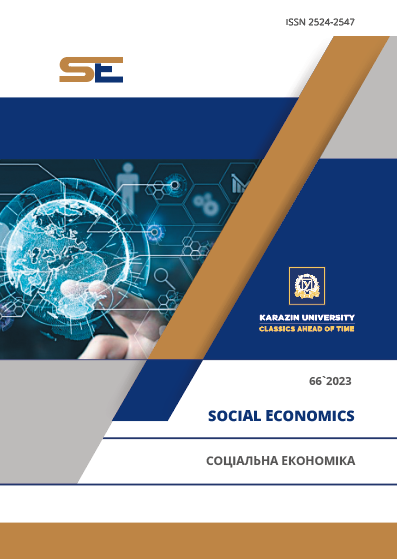GOVERNANCE TOKENS IN THE CONCEPT OF ELECTRONIC GOVERNMENT
Abstract
The purpose of writing the article is to evaluate the effectiveness of the use of governance tokens in the concept of electronic governance. We have found that traditional approaches to resource allocation and decision-making in the field of e-government often face a number of challenges, such as bureaucratic difficulties, lack of transparency in processes, and limited means of stimulating active participation from stakeholders. Governance tokens are defined as a form of cryptocurrency that gives holders the ability to influence the decision-making, management, development, and ecosystem of a particular blockchain project or decentralized platform. The study described the main aspects of governance tokens. We revealed the essence of governance tokens in the context of electronic governance. Also, we have found that governance tokens can be implemented through various technologies, including blockchain, smart contracts, and other digital solutions. The study turned out that blockchain has recently become a transformative technology, one of the latest participants in the comprehensive ideology of «smart cities». We emphasized that the use of blockchain technology raises significant privacy concerns, as many e-government services involve personal data that must be properly protected to avoid situations where the blockchain could become the target of attacks by attackers trying to obtain unauthorized access to the personal information of citizens.
The study presented modern examples of the use of governance tokens in the world. A SWOT analysis was conducted to identify the advantages and disadvantages of using governance tokens in the concept of electronic governance. The study established that the use of governance tokens in e-governance has its advantages, such as decentralization of decisions and encouraging participation, but also its challenges, such as technical barriers and the risk of vulnerability to manipulation. We noted that when implementing this approach, it is important to carefully balance the benefits and risks to ensure effective and sustainable e-government.
Downloads
References
Andrienko, A., & Mamatova, T. (2021). Blockchain technology as a driver of the smart city concept development. The Grail of Science, 2-3, 101–106. doi: https://doi.org/10.36074/grail-of-science.02.04.2021.018 (in Ukrainian)
Archireyskaya, N., & Kuchkova, O. (2019). Mechanism of cryptocurrency functioning. Business Inform, 2, 407–413. DOI: https://doi.org/10.32983/2222-4459-2019-2-407-413 (in Ukrainian)
Bondarenko, O. (2021). Introduction of blockchain technology in the public sector. Protocol. Retrieved from https://bit.ly/3lFNCET (in Ukrainian)
Bondarenko, O. (2023). Concept of virtual assets administrative support in Ukraine. KELM (Knowledge Education Law Management), 1, 199-205. doi: https://doi.org/10.51647/kelm.2023.1.30 (in Ukrainian)
Vasylyshyn, S., & Opirskyi, I. (2022). Development of e-government systems security based on blockchain. Ukrainian Information Security Research Journal, 2, 58–70. doi: https://doi.org/10.18372/2410-7840.24.16931 (in Ukrainian)
Dumchikov, M., & Shevtsov, Y. (2021). Prospects for the use of blockchain technology in the context of the formation and development of the state. Young scientist, 3 (91), 267–271. doi: https://doi.org/10.32839/2304-5809/2021-3-91-56 (in Ukrainian)
General Data Protection Regulation. (2016). GDPR Text, Translation and Commentary. Retrieved from https://gdpr-text.com/uk/ (in Ukrainian)
Klimushyn, P. S., & Spasibov, D. V. (2017). Mechanisms of e-government in the information society: monograph. Kharkiv: Harri NAPA «Master» Publishing House. (in Ukrainian)
Kotukh, E. V. (2020). E-governance as a new paradigm of public administration. Investments: practice and experience, 3, 122–127. doi: https://doi.org/10.32702/2306-6814.2020.3.122 (in Ukrainian)
Kuchkovskyi, V. (2021). Consensus algorithms of blockchain systems. Bulletin of Khmelnytsky National University, 3, 30–33. doi: https://www.doi.org/10.31891/2307-5732-2021-297-3-30-33 (in Ukrainian)
Reshetova, G. (2023). European experience of e-government implementation. Management and Entrepreneurship: Trends of Development, 23(1), 61-67. doi: https://doi.org/10.26661/2522-1566/2023-1/23-06 (in Ukrainian)
Terliuk, O. (2022). Blockchain technology in the context of opportunities for effective public administration digitalization. Bulletin of Lviv Polytechnic National University. Series: «Legal Sciences», 1(33), 121–128. doi: http://doi.org/10.23939/law2022.33.121 (in Ukrainian)
Shestakovska, T. L. (2023). Analysis of trends and challenges of the impact of digital technologies on public administration. Economic Synergy, 2, 8–22. doi: https://doi.org/10.53920/es-2023-2-1 (in Ukrainian)
Agbo, J. (2023). What are Governance Tokens and Why Do They Matter? CoinGecko. doi: http://surl.li/mbrmc
Chod, J., Trichakis, N., & Yang, S. A. (2019). Platform Tokenization: Financing, Governance, and Moral Hazard. Management Science, 68(9), 6411-6433. DOI: https://doi.org/10.2139/ssrn.3459794
Dotan, M., & Yaish, A. (2023). The Vulnerable Nature of Decentralized Governance in DeFi. Cryptography and Security. doi: https://doi.org/10.48550/arXiv.2308.04267
Fan, S., Min, T., Wu, X. et al. (2023). Towards understanding governance tokens in liquidity mining: a case study of decentralized exchanges. World Wide Web, 26, 1181–1200. doi: https://doi.org/10.1007/s11280-022-01077-4
Kaal, W. A. (2020). Decentralized Corporate Governance via Blockchain Technology. Annals of Corporate Governance, 5, 101–147. doi: https://doi.org/10.1561/109.00000025
Schoonwinkel, H. (2023). Towards Fair Presentation of DAO Treasuries: An Evaluation of Native Governance Token Reporting Practices. The Journal of The British Blockchain Association, 2, 1–8. doi: https://doi.org/10.31585/jbba-6-2-(3)2023
Vieira Fernandes, D. (2019). Tokens, «Smart Contracts» and System Governance. SSRN Electronic Journal. doi: https://doi.org/10.2139/ssrn.3492274




